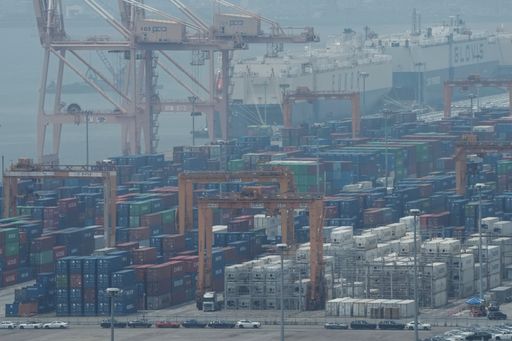South Korean Foreign Minister Cho Hyun is expected to meet US Secretary of State Marco Rubio for talks as early as Friday, ahead of a summit between the countries' leaders, the Yonhap News Agency reported.
US President Donald Trump and South Korean President Lee Jae Myung will hold a summit on Monday in Washington.
South Korea's foreign ministry declined to comment on the report.
First Trump-Lee summit
Trump will be hosting the South Korean president in Washington for their first summit meeting on Monday, after the countries struck a trade deal last month lowering US tariffs on the Asian ally to 15 percent from a threatened 25 percent.
Alongside trade, US pressure to redefine the decades-long military alliance is likely to be a focus, while Trump has said more South Korean investment plans will be announced in addition to a $350 billion package agreed last month.
Here are some of the main items that could be discussed.

Defence expenditure
Trump has accused its Asian ally of "free-riding" on US military might, with some 28,500 American troops stationed in South Korea to deter nuclear-armed North Korea.
Just before Trump won the presidential election in November last year, Seoul agreed to increase its contribution by 8.3 percent to 1.52 trillion won ($1.09 billion) for the first year in 2026, under a five-year plan.
Washington also wants its allies to increase defence spending to 5 percent of GDP. South Korea is currently well short of that after allocating 61.25 trillion won, or 2.3 percent of GDP, this year.
'Modernising’ alliance, China deterrence
US Under Secretary of Defense Elbridge Colby called South Korea a "role model" in taking a greater role in deterring North Korea but also called for "modernising" the alliance.
Experts say the summit may include discussions on the idea of adjusting the role of US troops from a focus on countering North Korea to also managing tensions in the Taiwan Strait and deterring China.
This could be sensitive for Seoul given how President Lee has, alongside declaring full support for the US alliance, sought to take a balanced approach to ties with Beijing.
Experts also warn giving US forces multiple missions could impede their primary focus of deterring and defeating a North Korean attack.
South Korean Foreign Minister Cho Hyun has denied Seoul was in talks with Washington over whether to allow US forces to be redeployed in the event of a Taiwan Strait emergency.

North Korea
South Korea has said the leaders will discuss how to work towards denuclearising the Korean peninsula.
Lee told Japan's Yomiuri Shimbun newspaper on Thursday his administration would lay the groundwork to ultimately dismantle North Korea's nuclear weapons programme, through talks with Pyongyang and close cooperation with Washington.
Lee has sought to reduce tensions with Pyongyang since taking office in June, while Trump still boasts of his historic summits with North Korean leader Kim Jong Un in his first term.
Lee and Trump have expressed a willingness to restart dialogue with Kim and they may deliver a joint message to North Korea, said Sydney Seiler, a senior adviser at the Center for Strategies and International Studies.
But North Korea has so far dismissed Lee's peace overtures, including dismantling loudspeaker propaganda broadcasts across the border.

Shipbuilding
During his US trip, Lee will visit the Pennsylvania-based Philly Shipyard, acquired by South Korean shipbuilder Hanwha Ocean and its parent group.
Officials in Seoul touted shipbuilding cooperation to help the US industry as instrumental in reaching a trade deal.
South Korea has agreed to invest $150 billion out of the overall investment package on US shipbuilding cooperation and more details may be announced during the summit.
Nuclear fuel
Foreign Minister Cho told parliament that South Korea could try to win approval from Washington to reprocess or enrich its own nuclear material during the summit, saying this is not for nuclear armament, but for industrial and environmental purposes.
South Korea is not allowed to reprocess spent nuclear fuel - which can be used to make nuclear weapons - without US consent under an agreement between the countries.
Seoul has also signed the Treaty on the Non-Proliferation of Nuclear Weapons.
While President Lee has rejected the idea of nuclear armament, his intelligence agency chief this year called for Seoul to secure the right to enrich uranium to demonstrate its "potential nuclear capabilities."
Corporate investment
South Korea said the leaders will discuss cooperation in sectors such as chips, batteries, shipbuilding, as well as "economic security" in areas such as cutting-edge technologies and key minerals.
Presidential adviser Kim Yong-beom said investments announced during the summit should include already announced projects such as Samsung Electronics' new chip factory in Texas and Hyundai Motor's car factory in Georgia, as well as Hanwha's plan to expand its US shipyard.
A South Korean newspaper reported Seoul would offer $150 billion of additional investment, or about six times its US foreign direct investment in 2024, according to government data.
South Korea's industry minister said it had not been decided.
The leaders may also discuss the timeframe to cut US tariffs on South Korean car imports from 25 percent to 15 percent as agreed under the trade deal.
The countries have appeared to have a different interpretation of details of the $350 billion investment fund, while Seoul denied US claims that it agreed to open up its rice market.



















